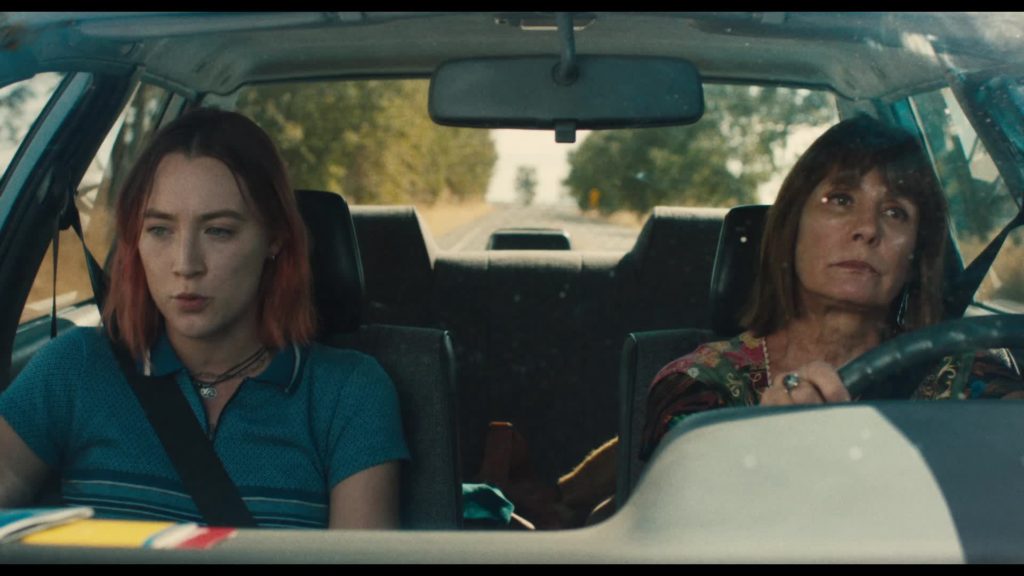Lady Bird (2017)

Set in Sacramento, California, in the year 2002, Lady Bird follows all-girls Catholic private school senior Christine McPherson, who lists among her vast array of idiosyncrasies, that she would no longer be called ‘Christine’, but “Lady Bird”. It’s an eventful year for the impulsive Lady Bird, as she discovers the joys and pains of falling in love, peer pressure, being in the school theater group, snooty cliques, being less than well-to-do, and trying to find her own path while still with her judgmental mother, Marion, who seems to see her as not living up to her true potential, or, as Lady Bird sees it, a disappointment.
Greta Gerwig writes and directs this fictional narrative that takes quite a bit from her own life, making a remarkable first solo effort without the hands of her boyfriend and frequent collaborator, writer/director Noah Baumbach. Gerwig, like Lady Bird, grew up in the Sacramento area, dubbed the “Midwest of California” as a teen in the early 2000s, longing to escape once she graduates, to New York City, perceived by her to a place where there are actual culture and ways to express oneself without being derided by parents, educators or peers who think she’s only fooling herself in dreaming she might get into a prestigious school on the East Coast.
It’s not an unfamiliar story, as we’ve seen many films about teens with dysfunctional parental relationships who have a tough time finding an identity and belonging while in high school. What makes Lady Bird unique among these is that its writer and director is a unique storyteller, imbuing her characters with distinct but sensible voices, and filling her story with lots of little tidbits that can only come from the mind of someone who has truly ‘been there’. It smacks of honesty and becomes relatable because we’ve either experienced something akin to what Lady Bird has gone through, even if we haven’t strived as hard to break out of the mold that others have tried to place upon us. Lady Bird, like the mature and free-flying name she gave herself, seeks independence and coming into her own, at a school, and in a home, where she doesn’t have a lot of say, even though she feels she has a lot to say. Not wanting to see this “Bird” fly too far from the nest, Marion can’t stand to see her daughter make bad decisions, but Lady Bird would rather make a bad decision on her own rather than let someone else call all of the shots for her.
The performances are brilliant, with Ronan continuing her streak as an actress at the forefront of critical appeal, and Metcalf with a truly magnificent portrayal of Marion, the seemingly resentful mother who can do no right by trying to guide her daughter to do no wrong. Their banter is performed with utmost sincerity to its characters, the way they talk over one another without actually listening beyond hearing something they assume they aren’t going to like, forcing irregular behavior in order to express frustration (an early scene involves an act of a character harming oneself in order to end some frustrated bickering). The two actresses seethe underneath trying to keep their composure, resulting in plenty of passive-aggressive comments when they aren’t out-and-out at each other’s throats, the mother wanting to be the best version of herself, and the daughter wondering if her mother will ever accept her for who she is and wants to be.
Though Ronan’s character is a surrogate for Gerwig and her experiences at the time, it’s to the writer-director’s credit that she can also see her own character as selfish, myopic, and wrongheaded in a way that further adds to her believability as a potential train-wreck who might just need someone to guide her, endearing her all the more for her flawed nature, especially as she appears to have the capability to grow. Though he’s not on the screen as much, Tracy Letts also shines as a father who is kind to his daughter in many ways, perhaps too kind to express his own displeasure and insecurities on those around him who seem overburdened with these feelings on their own.
Funny, sad, incisive and with a refreshingly authentic voice, Lady Bird emerges as one of the year’s finest releases, and one of the best ‘teen films’ to come out in many a year, even though the film doesn’t aim for that demographic the way other high-school movies tend to do. It also works well as a tale of a bickering mother and daughter who can’t seem to see eye to eye, and, to Gerwig’s credit, she does make her mother relatable and sensible, while still infuriating and petty, in a way that many of us can understand. Within the moment, it’s hard to find breathing room with all of the criticism, but in hindsight, we realize that much of it comes through wanting one’s best for one’s children, and Gerwig seems to have great respect for her mother’s ways despite butting heads, as she named Lady Bird with her mother’s name, Christine.
Gerwig has a great deal of affection for her characters, even ones who cross her stand-in, Lady Bird, and, in turn, we develop a fondness for them that makes the film pay off into becoming one of the must-see films of 2017.
Qwipster’s rating: A+
MPAA Rated R for language, sexual content, brief graphic nudity and teen partying
Running Time: 93 min.
Cast: Saoirse Ronan, Laurie Metcalf, Beanie Feldstein, Tracy Letts, Lucas Hedges, Lois Smith, Stephen Henderson, Odeya Rush, Jordan Rodrigues
Director: Greta Gerwig
Screenplay: Greta Gerwig
